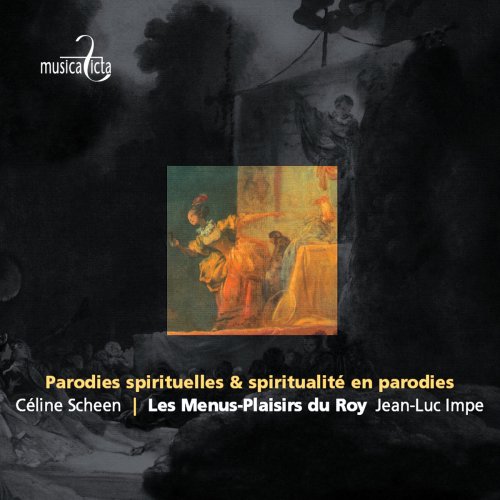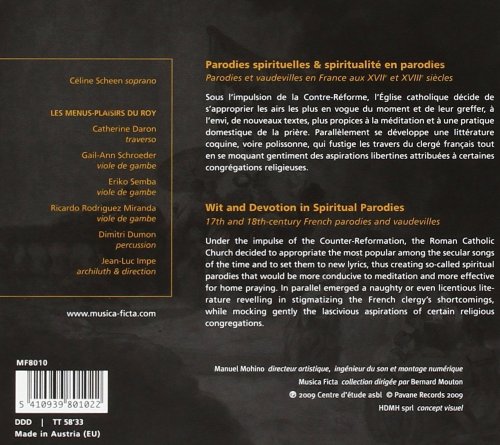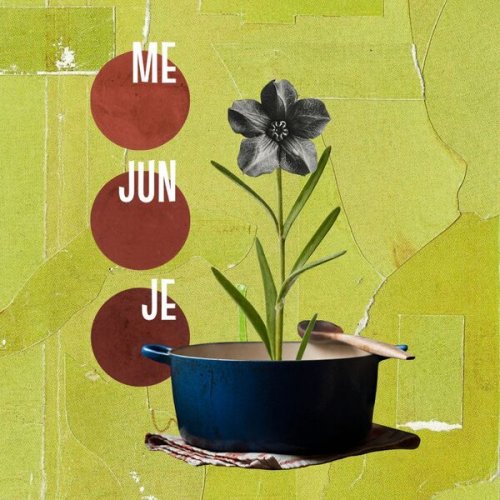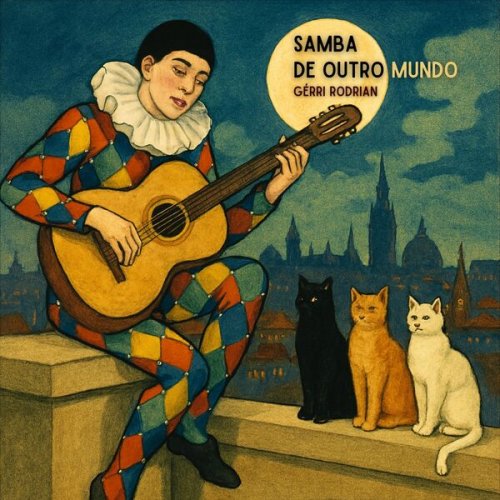Céline Scheen - Parodies spirituelles & spiritualité en parodies (2009)

Artist: Céline Scheen, Les Menus-Plaisirs du Roy, Jean-Luc Impe
Title: Parodies spirituelles & spiritualité en parodies
Year Of Release: 2009
Label: Musica Ficta
Genre: Classical
Quality: FLAC (tracks+booklet)
Total Time: 58:28 min
Total Size: 312 MB
WebSite: Album Preview
Title: Parodies spirituelles & spiritualité en parodies
Year Of Release: 2009
Label: Musica Ficta
Genre: Classical
Quality: FLAC (tracks+booklet)
Total Time: 58:28 min
Total Size: 312 MB
WebSite: Album Preview

Tracklist:
01. Surprise, ô Dieu, de vos lumières
02. Belle Philis, en attendant vos noces
03. Baisant, un soir, une mignarde
04. Les Manches vertes
05. Au jardin de mon père, un nid d'oiseau y a
06. Les Genoux et l'esprit
07. Une jeune nonnette
08. François, mon séraphique père
09. La Fustemberg
10. Oh! Que j'ai de contentement
11. Messieurs, ayez mémoire
12. Jean des sots
13. Rondeau
14. Quelle est cette beauté
15. Les Pèlerins de Saint-Jacques
16. La Sœur Luce
The concept of this release, a brainchild of French researcher, conductor, and archlute player Jean-Luc Impe, is a bit outrageous but also undoubtedly inventive, providing an instant corrective for anyone who thought odd mixtures of sacred and secular died with the Renaissance. The album's title, Parodies spirituelles et spiritualité en parodies (Spiritual Parodies and Spirituality in Parodies), suggests repertoires that are mirror images of each other. That's not quite the case, but they are oddly related. The "parodies spirituelles" are reworkings of early 17th century songs, refitted with sacred lyrics, rhythmically altered to a greater or lesser degree, and slowed down in keeping with the religious atmosphere. These have some of the naïve quality of Charpentier's sacred melodies of a half-century later, minus the court splendor. The "parodies" in which Impe finds spirituality might better be described as satires, and they're not spiritual in the conventional sense; in fact, they're pretty raunchy. Though Impe claims that these vaudevilles, as they were called "more irreverent in nature then genuinely polemical or anticlerical," some of them are pretty shocking now and must have been even more so at the time. Typical is the concluding La Soeur Luce, which ostensibly depicted a nun chasing a bug in her bedroom, but in fact seems, as Impe contends, to refer to masturbation. Some of these pieces are anonymous, which may well have been due to their controversial nature. The texts are given only in French, which is a shame for non-Francophones inasmuch as the imagery is allusive, humorous, and presumably filled with contemporary references. The average listener with rusty French will get only partway through. Still, this music, like much of the French repertoire of the period, has been absolutely unknown, and its unearthing in any form is something to be grateful for.




![Jay Cinema - A Smile to a Tear (2025) [Hi-Res] Jay Cinema - A Smile to a Tear (2025) [Hi-Res]](https://img.israbox.com/img/2026-02/15/3den0r6ij0gj805kc59em92op.jpg)

![Black Viiolet - Dark Blue (2026) [Hi-Res] Black Viiolet - Dark Blue (2026) [Hi-Res]](https://www.dibpic.com/uploads/posts/2026-02/1771144440_cover.jpg)

![Amal Murkus, Alessandro Sgobbio - تنفُّس Breathing (2026) [Hi-Res] Amal Murkus, Alessandro Sgobbio - تنفُّس Breathing (2026) [Hi-Res]](https://img.israbox.com/img/2026-02/12/9poaluplwioed8qjbmjfl2ajb.jpg)